高一英语必修3名词性从句---主语从句和表语从句导学案
名词性从句学案(优)

名词性从句复习学案班级_____________组别_________________姓名__________________【自主学习,明确目标】1.教学目标:1)了解名词性从句的定义、种类,及其位置。
2)掌握名词性从句的语序,引导词的选择及其技巧。
2.教学重点:熟记that,whether,if,what,which等引导词的特殊用法。
从1确定是什么从句。
2).分析从句的句子成分,缺什么,补什么;不缺句子成分,不缺意思,就选_______;不缺句子成分,只缺“是否”,就选__________或if;缺主语/宾语/表语,就补连接______词,选what,who,whom,which等;缺状语,就补连接_________词,选when,where,why,how 等。
3).确定词性后,再根据句子的意思选择适当的引导词。
我的问题:(你在预习中有哪些未能解决的问题和有疑问的地方?写在下面做个备忘吧!等待课堂上与老师和同学他就讨论解决。
)【合作探究,解决问题】探究一:观察句子,找出主句谓语,划出从句,判断从句类型。
1.Whoevercomesiswelcome.(____________从句)2.Itis?reported?that?three?people?were?killed?in?the?traffic?accidentyesterday.(___________从句)3.Thequestioniswhetherthefilmisworthseeing.(____________从句)4.Iwonderedwhyyouweresoangry.(____________从句)5.Italldependsonhowwesolvetheproblem.(____________从句)6.Ithinkitnecessarythatweshoulddoourhomework.(_____________从句)2.。
必修三_名词性从句:_主、宾、表从句
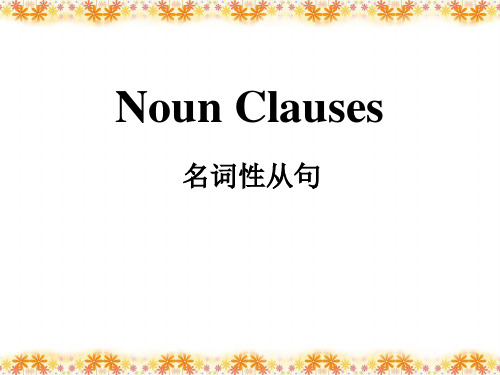
名词性从句
简单句、并列句、复合句
简单句:Many students took part in the sports meeting last year. 并列句: The school sports meeting was held last year and many students took part in it. but, or 主从复合句: •I’ll help you lose weight if you eat here every day. •He is the teacher who teaches us physics. •Everybody knows that the earth goes around the sun.
Objective Clause
1. 有从属连词、连接代词和连接副词
在句中不担任成分 在句中担任成分
•that, whether, if (是否)
•what, who, whom, whose, which, whoever, whichever, whatever, whomever •when, where, why, how
Predicative Clause
1. 有从属连词、连接代词和连接副词 that, whether, as if •what, who, whom, whose, which, whoever, whichever, whatever, whomever •when, where, why, how 2. 表语从句要用陈述语序 •The reason why … is that … •It is because …
4. He didn’t tell me _____ when he would come
高中英语语法之名词性从句-(1)
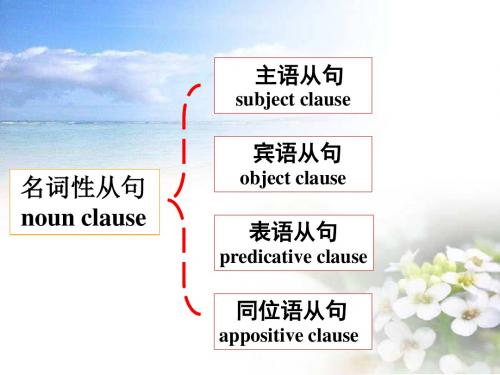
5. “疑问词+ever” whatever, whichever, whoever, whomever 引导宾语从句 I’ll show you whatever you want to see. He likes to makes friends with whoever shares his interest.
二、注意正确使用时态
1. 如果主句是一般现在时、一般将来时或祈使句时,宾 语从句时态不受限制 I hear he is here today/ he was here yesterday/ he will be here tomorrow. 2. 如果主句是一般过去时,宾语从句应与主句保持一致, 即使用过去时态的某种形式。 He said he was watching TV/ he had swept the floor/ he would play football after school. 3. 如果宾语从句所叙述的是客观事实、自然现象、科学 真理等时,从句不受主句限制,用一般现在时。 Everyone answered there are sixty minutes in an hour.
• 2.引导主语从句的词: • 连词:that, whether
起连接作用不充当成分
• 连接代词:what(ever),who(ever), which(ever),whose,
充当主语/宾语/定语等
• 连接副词:when, where, how ,why
充当状语表时间、地点、方式、原因
连接副词:when, where, how ,why引导的主语从句
1.I hear (that)___________.(一小时后会回来)
2.He said (that)___________.(他非常想我们) 3.The teacher told us (that)_____________. (地球围绕太阳转)
高一必修3语法《名词性从句》

Note: It is important/necessary/natural/our duty/essential/strange that sb (should) do sth. 固定句型, should可以省略
1. 我们就是这样克服困难的.
This is / That was how we overcame the difficulties.
2. 那就是他昨天缺席的原因.
That is why he was absent yesterdas where we met last Sunday.
令我惊讶的是在这儿见到他.
Details
Details Details Details
主语从句不用 if 5. It remains a secret how they climbed up the mountain. 他们是怎么登上山顶的仍是个秘密.
他来不来没什么要紧的.
主语太长了!放到句尾
主语从句的位置 1.在句首 2.主语较长时通常放在后面,句首主语用 It
同样作主语,从句可以表示较复杂的含义,一般是个动作或性质
I know him. I know that he is writing his composition in his room. 我知道他在房间里写作文. 从句的特征: 是一个句子,有一个引导词,引导词做从句的一个成分 (that 除 外)
宾语从句
3. The truth is that I have been there.
表语从句
4. The fact that she was late surprised us.
高中英语-名词性从句-教案
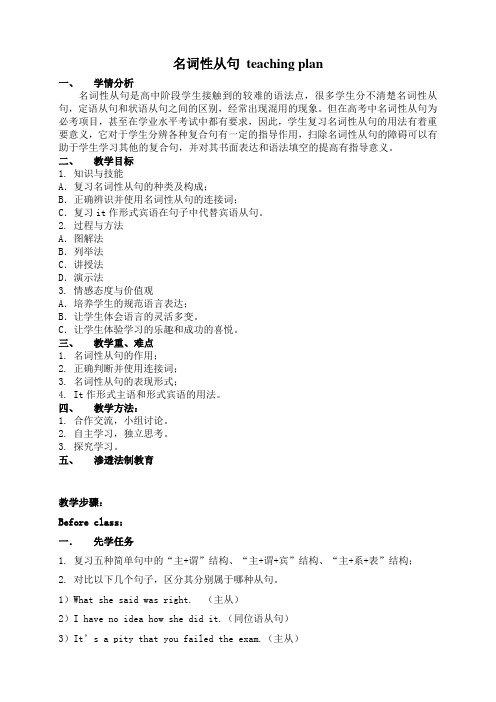
名词性从句teaching plan一、学情分析名词性从句是高中阶段学生接触到的较难的语法点,很多学生分不清楚名词性从句,定语从句和状语从句之间的区别,经常出现混用的现象。
但在高考中名词性从句为必考项目,甚至在学业水平考试中都有要求,因此,学生复习名词性从句的用法有着重要意义,它对于学生分辨各种复合句有一定的指导作用,扫除名词性从句的障碍可以有助于学生学习其他的复合句,并对其书面表达和语法填空的提高有指导意义。
二、教学目标1.知识与技能A.复习名词性从句的种类及构成;B.正确辨识并使用名词性从句的连接词;C.复习it作形式宾语在句子中代替宾语从句。
2. 过程与方法A.图解法B.列举法C.讲授法D.演示法3. 情感态度与价值观A.培养学生的规范语言表达;B.让学生体会语言的灵活多变。
C.让学生体验学习的乐趣和成功的喜悦。
三、教学重、难点1.名词性从句的作用;2.正确判断并使用连接词;3.名词性从句的表现形式;4.It作形式主语和形式宾语的用法。
四、教学方法:1.合作交流,小组讨论。
2.自主学习,独立思考。
3.探究学习。
五、渗透法制教育教学步骤:Before class:一.先学任务1.复习五种简单句中的“主+谓”结构、“主+谓+宾”结构、“主+系+表”结构;2.对比以下几个句子,区分其分别属于哪种从句。
1)What she said was right. (主从)2)I have no idea how she did it.(同位语从句)3)It’s a pity that you failed the exam.(主从)4)I’m sure that I will see you again.(宾从)5)What I want to know is when we’ll leave for Beijing.(主从、表从)6)Teachers consider it necessary that students should finish their homework.(宾从)3. 用适当的连接代词或连接副词填空。
必修一和必修三四大名词性从句

名词性从句一、基本概念:由连接词引导,在复合句中起名词作用的从句叫名词性从句。
它在复合句中能担任主语、宾语、表语、同位语、介词宾语等,因此根据它在句中不同的语法功能,名词从句又可分别称为主语从句、宾语从句、表语从句和同位语从句。
二、名词性从句连词选择总原则:看从句中缺少什么成分,根据意思选择适当连接词语;如不缺成分且句意完整,则选用that。
:一找:从句;二查:缺什么成分;三选:合适的连接词1 主语从句一、定义:主语从句是在复合句中充当主语的从句,通常放在主句谓语动词之前或由形式主语it代替,而本身放在句子末尾。
二、引导主语从句的连接词主要有三类:连接词that,whether;连接代词what,who,whose,whatever,whichever,whoever等;连接副词when,where,why,how等。
三、连接词that,whether引导:(1)that:在从句中不作任何成分,也没有词汇意义,一般不可省略。
That the college will take in more new students this year is true.(2)whether:引导主语从句常放于句首,有时也用it作形式主语替代。
Whether he can finish his task on time is of great importance.【特别注意】(1)if不能引导主语从句。
(2)形式主语it替代主语从句。
常见的it替代主语从句的句式主要有以下几种:A.It+系动词+形容词(obvious/true/natural/surprising/good/wonderful/funny/possible/likely/certain/probable 等)+that从句:It is quite clear that the whole project is doomed to failure.B.It+系动词+名词词组(no wonder/an honor/a good thing/a pity/no surprise等)+that从句:It is our hope that the two sides will work towards peace.C.It+be+v.ed形式(said/reported/thought/expected/decided/announced/arranged)+that从句It is announced that the plan has been successfully carried out.D.It+动词短语/动词(occur to/appear/seen/matter/turn out/make no difference)+that三、连接代词引导:①What we can’t get seems better than what we already have.②Who the letter was from is still unknown.③Whichever of you gets here first will get the prize.四、连接副词引导:①How acupuncture reduces and relieves pain is unclear.针灸是如何减轻和解除疼痛的还不清楚。
名词性从句主语从句宾语从句与表语从句

名词性从句主语从句宾语从句与表语从句在英语的语法体系中,名词性从句是一个重要且复杂的部分,其中包括主语从句、宾语从句和表语从句。
这三种从句在句子中起着不同但又相互关联的作用,理解和掌握它们对于我们正确、准确地运用英语语言至关重要。
首先,咱们来聊聊主语从句。
主语从句就是在一个句子中充当主语的从句。
比如说,“What he said is true”在这个句子里,“What he said”就是主语从句,整个句子表示“他说的是真的”。
主语从句通常会放在句子的开头,不过有时候为了避免句子头重脚轻,也会用“it”作形式主语,把真正的主语从句放在后面。
就像“It is a mystery how he passed the exam” 这里真正的主语是“how he passed the exam”,意思是“他是怎么通过考试的是个谜”。
接下来,咱们再看看宾语从句。
宾语从句呢,就是在句子中充当宾语的从句。
比如“ I don't know where he lives” 这里的“where he lives”就是宾语从句,整个句子意思是“我不知道他住在哪里”。
宾语从句通常跟在及物动词、介词或者某些形容词后面。
而且宾语从句的语序得是陈述句语序,也就是主语在前,谓语在后。
最后,说一说表语从句。
表语从句就是在句子中充当表语的从句。
举个例子,“The problem is that we don't have enough time” 在这个句子中,“that we don't have enough time”就是表语从句,整个句子表示“问题是我们没有足够的时间”。
表语从句通常跟在系动词后面。
那这三种从句有啥相似之处和不同点呢?相似的地方在于,它们都是从句,都有引导词,而且都要用陈述句语序。
不同的是,它们在句子中充当的成分不一样,主语从句是主语,宾语从句是宾语,表语从句是表语。
而且引导词也有一些差别,比如主语从句常用的引导词有what, whatever, who, whoever 等;宾语从句常用的引导词有 that, if, whether, what, which 等;表语从句常用的引导词有 that, whether, as if, as though 等。
必修3Unit 3 The Million Pound Bank Note语法导学案

纠错 归纳
3组
4组
【探究】 1) 1 组中 that 有实意吗?2 句中的第二个 that 可以省略吗?为什么? ________________________________________________________________ 2) 你能总结出 2 组中 whether 与 if 的用法区别吗?你能总结出只用 whether 的情 况吗? __________________________________________________________________. 3) 请在例 3 组和 4 组中的引导词底下划线, 并在括号内写出在从句作什么成分? 归纳: 一. 从“例句呈现”部分,我们可以得出结论: ① 宾语从句中,主句是一般现在时,从句可用_________时态,主句是一般过
2014—2015 学年度第二学期高一英语必修三导学案
编号:19
主备人:
备课组长:
复核人:
审批人:
纠错 表语从句-----在复合句中作表语的从句称作表语从句,位于连系动词(be,seem, Unit 3 The Million Pound Bank Note 语法导学案名词性从句---宾语从句和表语从句 We know( that )she did a good deed yesterday.2.I know( that )she is a teacher in this school andthatshe is an experienced one. c 归纳 课题:简单的组合体的三视图 remain 等)之后。 第二部分:探究案 【学习目标】 理解名词性从句的的概念、种类及其用法 。 学法指导:通过例句:总结出在名词性从句中,语序、时态、语气的用法规律, 【学习重点】 学习掌握名词性从句的连接词种类及其用法。 查阅语法书帮助我们学习名词性从句。 (可以参考课本 91—92 页) 【学习难点】 学习掌握名词性从句中的时态、语序及其否定转移现象,培养学 一、例句呈现 生用准确的语言表达自己思想的能力。 1组 1. We know (that) she did a good deed yesterday. 【使用说明】 2. I know (that) she is a teacher and that she is a good one. 1. 请同学们在自主学习时严格按照学法指导进行自学。 1. I went in and asked if/whether they had a cheap suit. 2. 除课堂检测外,其他题要求在自主学习课完成。 2. I wonder whether/if you will help me or not. 【自主学习】 第一部分:预习案 学法指导:通过观察例句对比、总结宾语从句和表语从句的用法。 一、感知: 1 组. ①. I know her ②. I know where she is from. ③ I know that she is an English teacher. ④. I am interested in what she did. 2 组. ①. This is the idea. ②. This is what the idea is. ③. This is why the idea is good. ④. My idea is that we should work hard at English. 上述句子 1 组哪些是宾语从句,_____________________________ 2 组中哪些为表语从句________________________________________。 二、概念:在复合句中起名词作用的从句叫名词性从句。 三、种类:四大类:宾语从句、表语从句、主语从句和同位语从句。 引导词:连词: that, whether, if, as if, as though 连词:that, whether, if, as if, as though 连接代词: 指人的 who(ever), whom(ever) , whose; 引导词: 连接代词:指人的 who(ever), whom(ever) , whose; 指物的 which(ever),what(ever), whose 指物的 which(ever),what(ever), 连接副词:when, where, why, because, how 等。 whose 连接副词:when, where, why, because, how 等。 宾语从句------在复合句中作宾语的从句称作宾语从句,可以作动词的宾语,也可 以作介词和及某些形容词的宾语。 引导宾语从句有连词 that,if,whether;连接代词 who,whose,what,which; 连接副词 when,where,how, why 等。 Gu 2组 3. I wonder whether or not you will help me. 4. Everyone depends on whether the situation will improve. 5. My question is whether we can get the money in time. 6. We will discuss whether we will go shopping this night. 1.He suggested that we (should ) go there. ( ) 2. Mr. Smith came out to see what was happening. ( ) 3. Do you know who is in charge of the company?( ) 4. You must help whoever needs help. ( ) 5. They don’t know which books are theirs. ( ) 6. Mothers can do whatever they can to help their children 1.I don’t think that he is right.( ) 2. The police asked me how the accident happened.( ) 3. I don’t know when we will meet again.( ) 4. She walked up to where I stood.( ) 5. The teacher asked him why he was late for school.(
名词性从句学案(语法精讲-主语从句、宾语从句、表语从句、同位语从句)+经典习题(含答案)

名词性从句名词性从句〔主语、表语、宾语、同位语从句〕(一)主语从句1.定义:用作主语的从句叫做主语从句。
2.构成:关联词+简单句3.引导主语从句的关联词有三类:(1) 附属连词that。
如:That they were in truth sisters was clear from the facial resemblance between them.很明显,她们确是亲姐妹,她们的脸型很相似。
(2) 附属连词whether。
如:Whether he’ll come here isn’t clear. 他是否会来这里还不清楚。
(3) 连接代词who, whom, whose, what, which, whoever, whatever, whichever连接副词where, when, how, why。
如:What she did is not yet known. 她干了什么尚不清楚。
解释:1.主语从句能用it作形式上的主语。
常以it作形式主语的句型有:A. It+be+形容词(obvious, true, natural, surprising, good, wonderful, funny, possible, likely, certain, probable, etc.)+that从句。
如:It is certain that she will do well in her exam. 毫无疑问她考试成绩会很好。
B. It+be+名词词组(no wonder, an honour, a good thing, a pity, no surprise, etc.)+that从句。
如:It’s a pity that we can’t go. 很遗憾我们不能去。
C.It+seem, happen等不及物动词及短语+that从句。
如:It seems that Alice is not coming to the party at all. Alice似乎不来参加晚会。
主语从句表语从句学案和专项练习
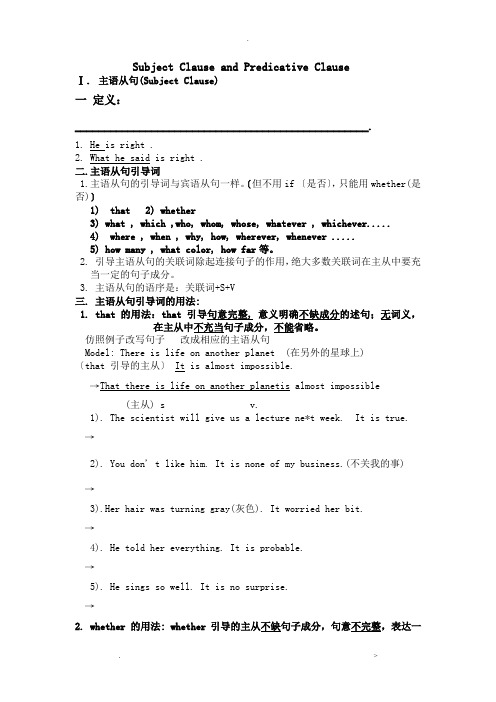
Subject Clause and Predicative ClauseⅠ. 主语从句(Subject Clause)一定义:__________________________________________________.1. He is right .2. What he said is right .二.主语从句引导词1.主语从句的引导词与宾语从句一样。
〔但不用if 〔是否〕,只能用whether(是否)〕1) that 2) whether3) what , which ,who, whom, whose, whatever , whichever.....4) where , when , why, how, wherever, whenever .....5) how many , what color, how far等。
2. 引导主语从句的关联词除起连接句子的作用,绝大多数关联词在主从中要充当一定的句子成分。
3. 主语从句的语序是:关联词+S+V三. 主语从句引导词的用法:1. that 的用法:that 引导句意完整, 意义明确不缺成分的述句;无词义,在主从中不充当句子成分,不能省略。
仿照例子改写句子改成相应的主语从句Model: There is life on another planet (在另外的星球上)〔that 引导的主从〕 It is almost impossible.→That there is life on another planetis almost impossible(主从) s v.1). The scientist will give us a lecture ne*t week. It is true. →2). You don’t like him. It is none of my business.(不关我的事) →3).Her hair was turning gray(灰色). It worried her bit.→4). He told her everything. It is probable.→5). He sings so well. It is no surprise.→2. whether 的用法: whether引导的主从不缺句子成分,句意不完整,表达一种不确定,不明确的概念;whether当"是否"讲,在主从中不充当句子成分。
2019-2020年高考英语复习《语法专题:名词性从句》导学案
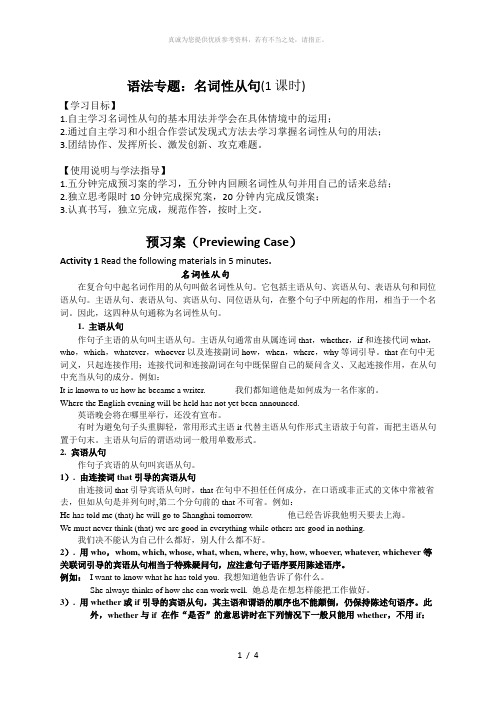
语法专题:名词性从句(1课时)【学习目标】1.自主学习名词性从句的基本用法并学会在具体情境中的运用;2.通过自主学习和小组合作尝试发现式方法去学习掌握名词性从句的用法;3.团结协作、发挥所长、激发创新、攻克难题。
【使用说明与学法指导】1.五分钟完成预习案的学习,五分钟内回顾名词性从句并用自己的话来总结;2.独立思考限时10分钟完成探究案,20分钟内完成反馈案;3.认真书写,独立完成,规范作答,按时上交。
预习案(Previewing Case)Activity 1 Read the following materials in 5 minutes.名词性从句在复合句中起名词作用的从句叫做名词性从句。
它包括主语从句、宾语从句、表语从句和同位语从句。
主语从句、表语从句、宾语从句、同位语从句,在整个句子中所起的作用,相当于一个名词。
因此,这四种从句通称为名词性从句。
1. 主语从句作句子主语的从句叫主语从句。
主语从句通常由从属连词that,whether,if和连接代词what,who,which,whatever,whoever以及连接副词how,when,where,why等词引导。
that在句中无词义,只起连接作用;连接代词和连接副词在句中既保留自己的疑问含义、又起连接作用,在从句中充当从句的成分。
例如:It is known to us how he became a writer. 我们都知道他是如何成为一名作家的。
Where the English evening will be held has not yet been announced.英语晚会将在哪里举行,还没有宣布。
有时为避免句子头重脚轻,常用形式主语it代替主语从句作形式主语放于句首,而把主语从句置于句末。
主语从句后的谓语动词一般用单数形式。
2. 宾语从句作句子宾语的从句叫宾语从句。
1). 由连接词that引导的宾语从句由连接词that引导宾语从句时,that在句中不担任任何成分,在口语或非正式的文体中常被省去,但如从句是并列句时,第二个分句前的that不可省。
高中英语名词性从句讲教案人教版必修三

名词性从句英语从句其实就是三个句型的衍生物。
掌握了三个句型就已经掌握了名词性从句。
名词性从句并不难。
只是在我们过去学过的三种基本句型中出现名词的位置上,根据需要将名词扩大成一个句子,并做小小的改动。
也就是说在一个主系表或主谓宾句型中再套上一个主系表或主谓宾的句子而已。
注意中英文表达上的区别I know the teacherI knowIIII believe that you know that she found that▲由连词that、if、whether引导的名词性从句主语谓语宾语〔宾语从句〕每个人都知道地球围着太阳运行。
主语状语谓语主语谓语宾语〔宾语从句〕●Everyone knows连词主语谓语状语从上面的例句可以看出,宾语从句只是将宾语扩大成一个句子,并用连词 that 引导。
因为 that 没有实际意思,通常可以省略。
主语〔主语从句〕系表语地球围着太阳运行是一条真理。
主语〔主语从句〕系表语●形式主语系表语主语〔主语从句〕● It is a truth同样的一个句子,当把它放在主语的位置时,我们便称其为主语从句。
通常将主语从句放在句子的后面,并用 it 代替其原先的位置,叫做形式主语。
在这种情况下,连词 that 通常不省。
主语系● My idea is我的意思是星期天我们去长城。
从上面的句子可以看出将一个完整的句子置于表语的位置,便称作表语从句。
主语从句、表语从句以及宾语从句在句子中所占的位置是名词的位置,所以称它们为名词性从句。
由连词if、whether引导的名词性从句也是完整的句子,所不同的是 that 在句子中没有实际意思,可以省略,而 if、whether因为有是否的意思,故不可省略。
●●I wonder形式主语系表语主语从句注:whether可加or not而if 不能。
有时我们可以将由whether引导的主语从句放在句首,if那么不能。
●found●不要忘了,世界上最强大的力量是爱情。
高一英语必修3名词性从句讲解
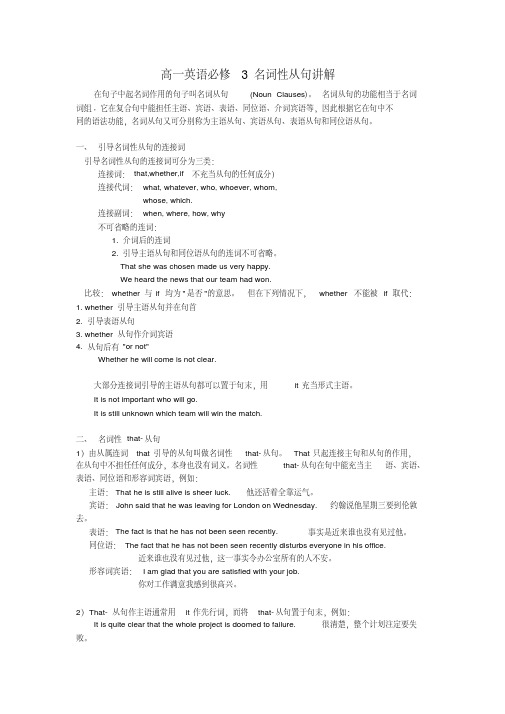
高一英语必修3名词性从句讲解在句子中起名词作用的句子叫名词从句(Noun Clauses)。
名词从句的功能相当于名词词组, 它在复合句中能担任主语、宾语、表语、同位语、介词宾语等,因此根据它在句中不同的语法功能,名词从句又可分别称为主语从句、宾语从句、表语从句和同位语从句。
一、引导名词性从句的连接词引导名词性从句的连接词可分为三类:连接词:that,whether,if 不充当从句的任何成分)连接代词:what, whatever, who, whoever, whom,whose, which.连接副词:when, where, how, why不可省略的连词:1. 介词后的连词2. 引导主语从句和同位语从句的连词不可省略。
That she was chosen made us very happy.We heard the news that our team had won.比较:whether与if 均为"是否"的意思。
但在下列情况下,whether 不能被if 取代:1. whether引导主语从句并在句首2. 引导表语从句3. whether从句作介词宾语4. 从句后有"or not"Whether he will come is not clear.大部分连接词引导的主语从句都可以置于句末,用it充当形式主语。
It is not important who will go.It is still unknown which team will win the match.二、名词性that-从句1)由从属连词that引导的从句叫做名词性that-从句。
That只起连接主句和从句的作用,在从句中不担任任何成分,本身也没有词义。
名词性that-从句在句中能充当主语、宾语、表语、同位语和形容词宾语,例如:主语:That he is still alive is sheer luck.他还活着全靠运气。
高中英语_名词性从句教学设计学情分析教材分析课后反思
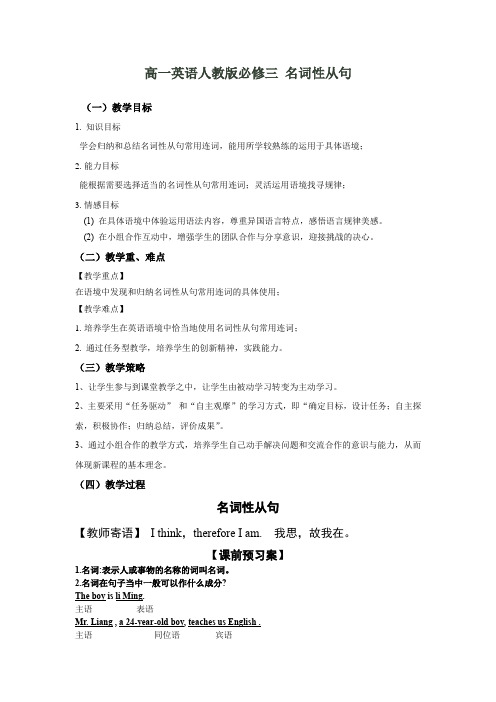
高一英语人教版必修三名词性从句(一)教学目标1. 知识目标学会归纳和总结名词性从句常用连词,能用所学较熟练的运用于具体语境;2.能力目标能根据需要选择适当的名词性从句常用连词;灵活运用语境找寻规律;3.情感目标(1) 在具体语境中体验运用语法内容,尊重异国语言特点,感悟语言规律美感。
(2) 在小组合作互动中,增强学生的团队合作与分享意识,迎接挑战的决心。
(二)教学重、难点【教学重点】在语境中发现和归纳名词性从句常用连词的具体使用;【教学难点】1.培养学生在英语语境中恰当地使用名词性从句常用连词;2. 通过任务型教学,培养学生的创新精神,实践能力。
(三)教学策略1、让学生参与到课堂教学之中,让学生由被动学习转变为主动学习。
2、主要采用“任务驱动”和“自主观摩”的学习方式,即“确定目标,设计任务;自主探索,积极协作;归纳总结,评价成果”。
3、通过小组合作的教学方式,培养学生自己动手解决问题和交流合作的意识与能力,从而体现新课程的基本理念。
(四)教学过程名词性从句【教师寄语】I think,therefore I am. 我思,故我在。
【课前预习案】1.名词:表示人或事物的名称的词叫名词。
2.名词在句子当中一般可以作什么成分?The boy is li Ming.主语表语Mr. Liang , a 24-year-old boy, teaches us English .主语同位语宾语在英语的句子结构中,本来该由名词充当的主语、宾语、表语和同位语,由一个句子来充当,这个句子就叫名词性从句。
包括: , , , 。
引导名词性从句连接词有:连接词作用 that (本身无词义)whether / if “是否”只起连接词作用,引导从句,在从句中不作 任何成分 who, whom, whose 谁(的)which 哪一个what 什么,所…的事物,东西wh --ever除了起连接词作用外, 在从句中作主语、宾语、表语和定语 when 什么时候,where 什么地方how 怎样、怎么,why 为什么wh --ever , ------除了起连接词作用外,还在从句中作状语名词性从句高考考查主要内容①连接词的选择与判断;①词序:陈述语序;①时态:主从句时态一致 【课中探究案】1. 掌握各种名词性从句的用法。
导学案 名词性从句(2)
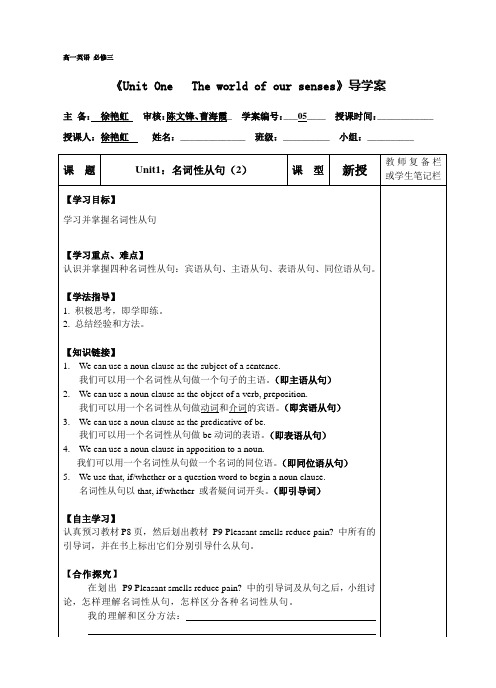
《Unit One The world of our senses》导学案
主备:徐艳虹审核:陈文锋、曹海霞_学案编号:___05____授课时间:____________
授课人:徐艳虹姓名:______________班级:__________小组:__________
课 题
Unit1:名词性从句(2)
7.It was good news that everyone got back safely.
8. We all thought it good news that the fog had finally gone.
名词性从句以that, if/whether或者疑问词开头。(即引导词)
【自主学习】
认真预习教材P8页,然后划出教材P9 Pleasant smells reduce pain?中所有的引导词,并在书上标出它们分别引导什么从句。
【合作探究】
在划出P9 Pleasant smells reduce pain?中的引导词及从句之后,小组讨论,怎样理解名词性从句,怎样区分各种名词性从句。
我们可以用一个名词性从句做be动词的表语。(即表语从句)
4.We can use a noun clause in apposition to a noun.
我们可以用一个名词性从句做一个名词的同位语。(即同位语从句)
5.We use that, if/whether or a question word to begin a noun clause.
我们可以用一个名词性从句做一个句子的主语。(即主语从句)
2.We can use a noun clause as the object of a verb, preposition.
【新教材精创】7.1 Masterpieces 导学案(1)-北师大版高中英语必修第三册
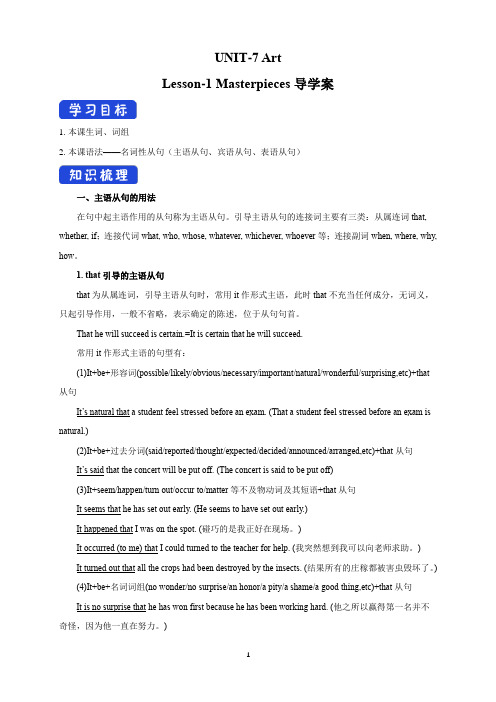
UNIT-7 ArtLesson-1 Masterpieces导学案1.本课生词、词组2.本课语法——名词性从句(主语从句、宾语从句、表语从句)一、主语从句的用法在句中起主语作用的从句称为主语从句。
引导主语从句的连接词主要有三类:从属连词that, whether, if;连接代词what, who, whose, whatever, whichever, whoever等;连接副词when, where, why, how。
1. that引导的主语从句that为从属连词,引导主语从句时,常用it作形式主语,此时that不充当任何成分,无词义,只起引导作用,一般不省略,表示确定的陈述,位于从句句首。
That he will succeed is certain.=It is certain that he will succeed.常用it作形式主语的句型有:(1)It+be+形容词(possible/likely/obvious/necessary/important/natural/wonderful/surprising,etc)+that 从句It’s natural that a student feel stressed before an exam. (That a student feel stressed before an exam is natural.)(2)It+be+过去分词(said/reported/thought/expected/decided/announced/arranged,etc)+that从句It’s said that the concert will be put off. (The concert is said to be put off)(3)It+seem/happen/turn out/occur to/matter等不及物动词及其短语+that从句It seems that he has set out early. (He seems to have set out early.)It happened that I was on the spot. (碰巧的是我正好在现场。
人教版高中英语必修三[主语从句]课堂教学设计
![人教版高中英语必修三[主语从句]课堂教学设计](https://img.taocdn.com/s3/m/71638b145e0e7cd184254b35eefdc8d376ee1427.png)
“主语从句”教学设计【教材依据】人教版高中英语必修三Unit 4 Astronomy:The Science of the Stars 语法:主语从句一、设计思路1、指导思想主语从句是高中英语中一个重要的语法项目,它在高考中占的比例中也是举足轻重的,在阅读,完型,语法填空,改错题中无所不在。
尤其是作文中,学生如果能正确,漂亮地使用几个名词性从句,就能成为其亮点和增分点。
因此,我们要对它着重讲解。
主语从句是在上一单元讲解了宾语从句和表语从句的基础上讲的,因此并不算太难。
2、教学目标根据英语学科核心素养的要求,经过本课的学习,学生能够:(1)语言能力:a. 能辩认出主语从句。
b. 知道主语从句的三要素,正确使用主语从句。
c. 按句子所缺成分和意义正确使用主语从句的连接词。
d.能够学以致用,在平时的交流中能够用上名词性从句,真正达到其交际运用的功能。
(2)学习能力:通过任务训练,培养学生的团队合作意识,提高学生互相学习、互相帮助的意识。
(3)文化意识疫情相关例句的导入,让学生关注时事,知道只要坚定信心,就一定能取得成功,增强国家认同感,培养爱国情怀。
(4)思维品质通过比较所获得的信息,能够归纳、概括其语法规律,并在实践中,用于处理解决新的问题。
3、教学重点与难点:a. 正确选择主语从句的连接词。
b. 在训练学生语言能力同时,注重培养学习英语的兴趣,培养学生的合作能力,提升学生的整体素质。
二、教学准备教学设计、多媒体课件、导学案、彩色粉笔、活动用的卡片三、教学过程【一】预习检查表扬激趣1.组长汇报预习检查的结果。
2.导入:每组抽一名学生翻译预习案上的句子,检查预习效果,并通过主语来导入主语从句的定义。
即:主语是动作的执行者,一般位于谓语动词之前。
在句子中,充当主语的从句,叫做主语从句。
3.句式升级(简单句变复合句)(1)The news makes us anxious.(2)The number of COVID-19 cases worldwide has surpassed 200 million.合并:That the number of COVID-19 cases worldwide has surpassed 200 million makes us anxious.设计意图:让学生通过观察例句找出主语,明白主语不仅仅可以由名词、代词、不定式、动名词还可以由句子充当。
- 1、下载文档前请自行甄别文档内容的完整性,平台不提供额外的编辑、内容补充、找答案等附加服务。
- 2、"仅部分预览"的文档,不可在线预览部分如存在完整性等问题,可反馈申请退款(可完整预览的文档不适用该条件!)。
- 3、如文档侵犯您的权益,请联系客服反馈,我们会尽快为您处理(人工客服工作时间:9:00-18:30)。
Noun Clauses (名词性从句) 导学案Part1.主语从句(Noun Clauses as the Subject)一.导学【什么是名词性从句?】原来名词性从句是从另一个角度所命名的从句,即在句中起名词作用的从句就叫名词性从句名词性从句包括,,,。
定义-----用作的从句就叫主语从句,它是名词性从句之一。
Step1:感悟下列各句的主语并且划出下列句中的主语:(标出词性)1. You are a student2. A tree has fallen across the road.3. Smoking is bad for you.4. To find your way can be a problem.5. It is impossible to finish this task in half an hour.6. 30 years has seen the changes in our hometown.Step2.认识主语从句,主语从句在从句中作主语。
1).What is needed for the space trip is careful preparation.2).Whether wild life can be well protected is of great importance.3).Who will go makes no difference.4).Which kind of food is the best is still not certain.5).When they will have a new restaurant opened has not been decided yet.6) How gold was found there is not clear.7). Why there is gravity is hard to understand.8)It is our duty that we students clean the classroom every day.思考与探究:<1> 作主语的可以是<2> 从句用什么语序?<3> 8)句子的主语怎么不在句首?★注意:1. That-从句作主语通常用it作先行词,而将that-从句置于句末,例如:It is true that the earth is round.It's a pity that you should have to leave.你非走不可真是件憾事。
2.表示“是否”意义时,用whether 而不用if引导主语从句,Whether she will come or not is still a question .(但如果有形式主语it引导时,既可用whether,也可用if)。
3.有时可用形式主语it 代替主语从句:e.g. It is still a question whether she will come or not . =It has not been decided yet when they will start .★用it作形式主语的that-从句有以下四种不同的搭配关系:a.It + be +形容词+ that-从句It is necessary that…有必要……It is important that…重要的是……It is obvious that…很明显……b. It + be + -ed 分词+ that-从句It is believed that…人们相信……It is known to all that…众所周知……It has been decided that…已决定……c. It + be +名词+ that-从句It is common knowledge that….....是常识It is a surprise that…令人惊奇的是……It is a fact that…事实是……d. It +不及物动词+ that-分句It seems/appears that…似乎……It happens that…碰巧……It occurred to me that …我突然想起……Step 3:寻规找矩:请划出下列各句的主语(部分)。
1. That she was chosen made us very happy.2. Who will go to the concert is not known.3. Whether she will come or not is still a question.4. Which book they will choose is still unknown.5. When we shall hold our sports meet is not decided.6. Why dinosaurs died out remains a puzzle.7. How they will solve the serious problem today has not been decided.8 . What surprised me most was that the little girl could play the violin so well.9. Whoever leaves the room last ought to turn off the lights.10. It’s strange that he knows nothing about it.11. It is a pity that she has made such a mistake.12. It is said that President Hu Jingtao will visit our school next week.[小结归纳]主语从句的引导词有:_________________________________________________________________________________________ ________________________________________________________________________________________ ★what与that在引导名词性从句时的区别:what引导名词性从句时在从句中充当句子成分,如主语,宾语,表语. 而that则不然,它在句子中只起连接作用,没有意义.(1) ______ you said yesterday is right.(2) ______ the earth goes around the sun is well-known to everybody.Step3: 用适当的词填空,使句子意思完整。
who, whom, what, whose, which, whichever, whatever, whoever, when, where, how, why, , that, if, whether,1. __________ he didn’t attend the meeting yesterday wasn’t quite clear.2. The Foreign Minister said, “It is our hope _______ the two sides will work towards peace.”3. _________ team will win the match is still unknown.4. _________ comes to the party will receive a present.5. __________ Mary has left is still a question.6. It’s reported _________ three people were killed in the accident and five were hurt badly.7. _________ he solved the problem successfully interested all of us.8. We usually think _________ we can’t get seems better than what we have.9. It is a fact ________ English is being accepted as an international language.10. __________ is to be sent there to solve the problem hasn’t been decided.Step4: Translation 用主语从句翻译下列句子所缺部分1. 这位老人的儿子想知道的是金子藏在哪里了。
is where the gold is hidden. 2. 他是否能顺利的完成这项任务还是不确定的。
is uncertain.3. 每个人都有一本字典是很有必要的。
everybody has a dictionary. 4. 谁杀死了这位科学家仍然是一个迷。
is still( remains) a puzzle. 5. 他们是怎么去美国的,这正是我所想知道的事情。
is just what I wanted to know. 6. 车祸为何会发生是我们所关心的事情。
is what we are concerned about. 7. 我们成功举办了2008年奥运会是一个伟大的荣幸(honor)。
that we held the 2008 Olympics successfully.8. 据报道刘德华将在四月底结婚。
Andy Liu is getting married in late(at the end of)April.9. 重要的是,大家都知道自己该做些什么。
everybody knows what he should do.Part2. 表语从句(Noun Clauses as the Predicative)定义-----用作___ 的从句就叫表语从句,它是名词性从句之一。
Step1:感悟下列各句的主语并且划出下列句中的表语:标出其词性1. My mother is beautiful.2. the man who is standing there is my father.3.My job is teaching English.4.The important thing in life is to have a great aim.5.My books are in my schoolbag.Step2认识表语从句,表语从句在复合句中做表语1)Her wish is that she could lose weight soon.2) The question is whether it is worth doing.3) It looked as if it was going to snow.4) The problem was who could do the work.5) That is what he is worried about.6) His trouble is where he can find a new job.7) That is why the brothers wanted to make a bet.思考与归纳:<1> 作表语的还可以是<2> 从句的语序必修是语序<3> 从句前面是动词;3)句中从句前是动词Step 3:寻规找矩:请划出下列各句的表语(部分)。
